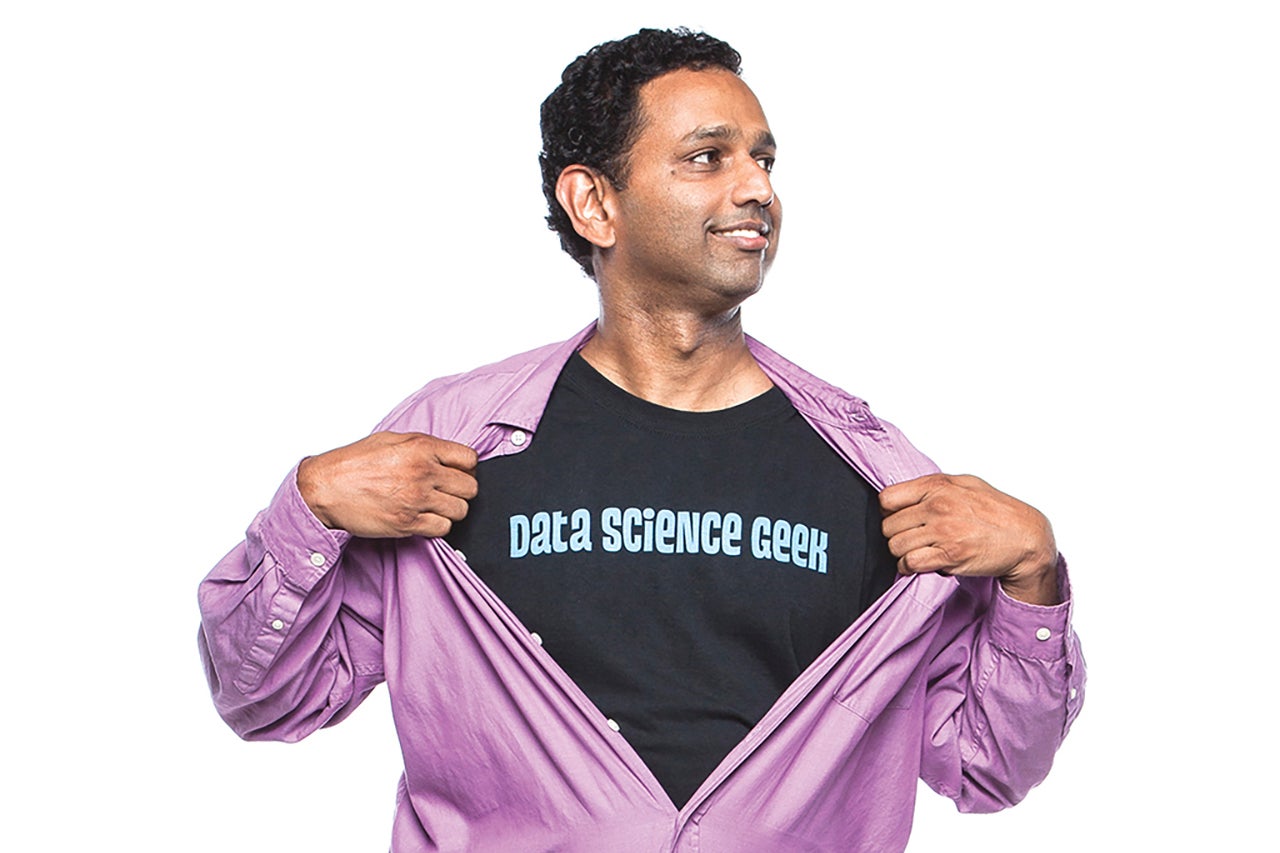As an instructor in the Department of Computer Science and the School of Business, as well as the advisor to the College’s Honors Entrepreneurship Mentoring Cohort, Honors College Faculty Fellow Lancie Affonso ’96 is a true renaissance man on campus. We caught up with Affonso to learn more about his childhood in Africa, his journey from tech to higher ed, and where the worlds of computer science, business and entrepreneurship collide.
What was life like growing up in Tanzania? As a child, I was fortunate to experience a simple life without the distractions of electronic devices. Tanzania is a country that is blessed with an abundance of natural resources, but it is also one of the poorest countries in the world. I sometimes play the “Hakuna Matata” video from Disney’s The Lion King for my students. Hakuna Matata, which means “no worries” in Swahili, describes my philosophy of life growing up in an unplugged world.
I enjoyed fishing, cycling and soccer, as well as playing in the mud and rain with my siblings. My mother taught me about sustainability. We reused, repurposed and recycled almost everything. My father taught me about carpentry and entrepreneurship. When I was a teenager, my first venture was designing, building and marketing wooden toys for the tourist market. And that’s how I eventually saved up to pay for my airfare to the U.S. to study and pursue my American dream.
How do you think your childhood has influenced your work in higher education? Education is a privilege in East Africa. Books were scarce and expensive, so I spent much of my free time at the American Embassy library, where I consumed science encyclopedias along with an eclectic collection of books. Yes, I was a “data geek.”
My parents placed a very high value on learning, and encouraged us to learn something new each day. My mother also sacrificed the majority of her yearly income to ensure that I was the first person in my family to complete high school and have an opportunity to study in the United States. Little did I know I would end up on the extended college plan and teach at CofC after working in the corporate sector.
What initially drew you to the world of software development and technology? My CofC faculty mentors recommended I pursue a career in international business with a software startup, as I would get paid to learn about new technology, manage global teams and travel the world.
So, I followed their advice and first worked as an international business analyst for Sonoco Products, where I researched and analyzed market data for consumer products in Thailand, Mexico, Brazil and Japan. I then transitioned to Datastream Systems as an enterprise software consultant, and later served as their global director of software development services.
Why did you turn your attention to a career in higher education? After receiving departmental honors for my undergraduate research at the College, several of my faculty mentors had suggested I consider a career in academia. I followed their advice – albeit, a decade later – when I “retired” back to Charleston after Datastream was sold.
After the births of my two daughters and 16 years of teaching, I am now even more committed to higher education and hope to teach and mentor the next generation of service leaders and impact entrepreneurs.
You wear a lot of hats on campus. Can you list them all? Like Dr. Seuss’ The Cat in the Hat, I like to think that I wear only one interdisciplinary Cougar hat with multiple stripes for each of the disciplines I teach.
I have taught courses in computer and data science, entrepreneurship, sustainability, information systems, decision sciences, management, marketing, economics and finance. I love to collaborate with and learn from other faculty, and I often teach learning community and interdisciplinary seminar courses for the First Year Experience and the Honors College.
That’s a lot of stripes. How do you balance these different roles? The roles are all interrelated, so it’s not as overwhelming as it sounds. I must admit, though, that balancing three departmental meetings and course schedules can be a challenge from time to time. But the rewards of interdisciplinary collaboration are well worth the effort.
What is your favorite object in your office? It’s a combined abacus and chalkboard (my first computer and tablet from 1986). It’s the well-used original design prototype for my most successful toy learning product, which now includes a chalk flower drawing by my daughter when she was 5 (she is now 14).
In your mind, how do the fields of computer science, business and entrepreneurship intersect? I believe the emerging area of predictive analytics in data science represents the new intersection of the three fields. That’s increasingly evident by the data-driven global startups as well as those in Charleston’s Silicon Harbor.
What is your teaching philosophy when it comes to mentoring and encouraging students? I am committed to developing my students’ concept of purposeful life work by encouraging them to reflect on what really matters to them. We live in an increasingly global community, and our students want to make a difference. My goal is to encourage them to use the entrepreneurial mindset to find creative solutions to local and global problems.
You do a lot for students. What do you do to relax? To unplug, I indulge in power siestas after a relaxing meal. I bike almost everywhere, as it’s convenient, eco-friendly – and I get to claim it as exercise. I love to visit parks. I also enjoy camping and spending time in nature. My kids try to get me to jump on the trampoline, with amusing results. And, my family loves to swim, while I focus on staying afloat.





